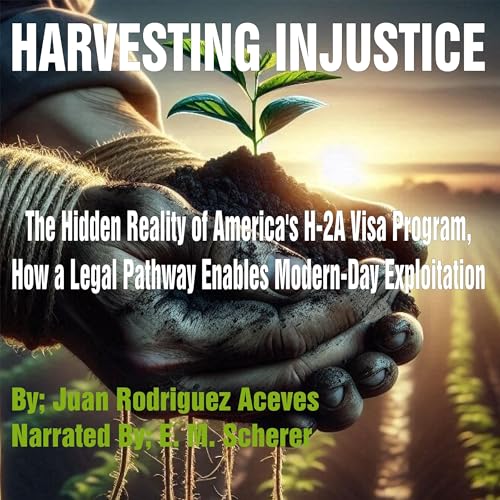
Harvesting Injustice
The Hidden Reality of America's H-2A Visa Program, How a Legal Pathway Enables Modern-Day Exploitation
No se pudo agregar al carrito
Add to Cart failed.
Error al Agregar a Lista de Deseos.
Error al eliminar de la lista de deseos.
Error al añadir a tu biblioteca
Error al seguir el podcast
Error al dejar de seguir el podcast
Obtén 3 meses por US$0.99 al mes
 Exclusivo para miembros Prime: ¿Nuevo en Audible? Obtén 2 audiolibros gratis con tu prueba.
Exclusivo para miembros Prime: ¿Nuevo en Audible? Obtén 2 audiolibros gratis con tu prueba.
Compra ahora por $24.95
-
Narrado por:
-
E. M. Scherer
Every time you bite into fresh strawberries or crisp lettuce, you're connected to a hidden world of agricultural workers whose stories remain untold.
Harvesting Injustice exposes how America's H-2A visa program—designed to protect temporary agricultural workers—has become a sophisticated mechanism for legal exploitation.
Drawing from his family's multigenerational experience with agricultural labor programs, author Juan Rodriguez Aceves reveals the invisible chains binding hundreds of thousands of workers who feed America. His grandfather and father participated in the Bracero Program sixty years ago; today, he witnesses how legal frameworks still enable systematic abuse through economic dependency, geographic isolation, and cultural barriers.
His investigation reveals how employers use sophisticated legal strategies to maintain worker control while technically complying with federal regulations.
This is not another academic study gathering dust on shelves. Harvesting Injustice speaks directly to Americans who care about human dignity but don't understand how daily food choices connect to worker welfare.
Rodriguez Aceves transforms complex policy into compelling human stories while providing practical guidance for consumers, voters, and community members who want to create change.
The book exposes hidden subsidies making cheap food possible through worker exploitation, examines successful international models proving alternatives exist, and empowers listeners with concrete actions—from ethical consumption to community advocacy—that generate real impact.
His writing combines analytical rigor from his accounting background with moral authority from living the immigrant experience and witnessing systematic injustice firsthand.
In an era when food security, immigration policy, and human rights increasingly intersect, this book provides essential knowledge and tools for creating agricultural systems serving both
economic efficiency and human dignity.



